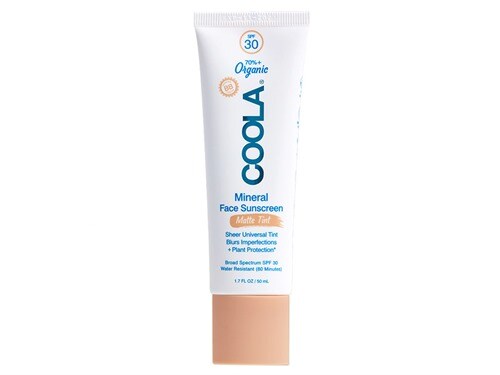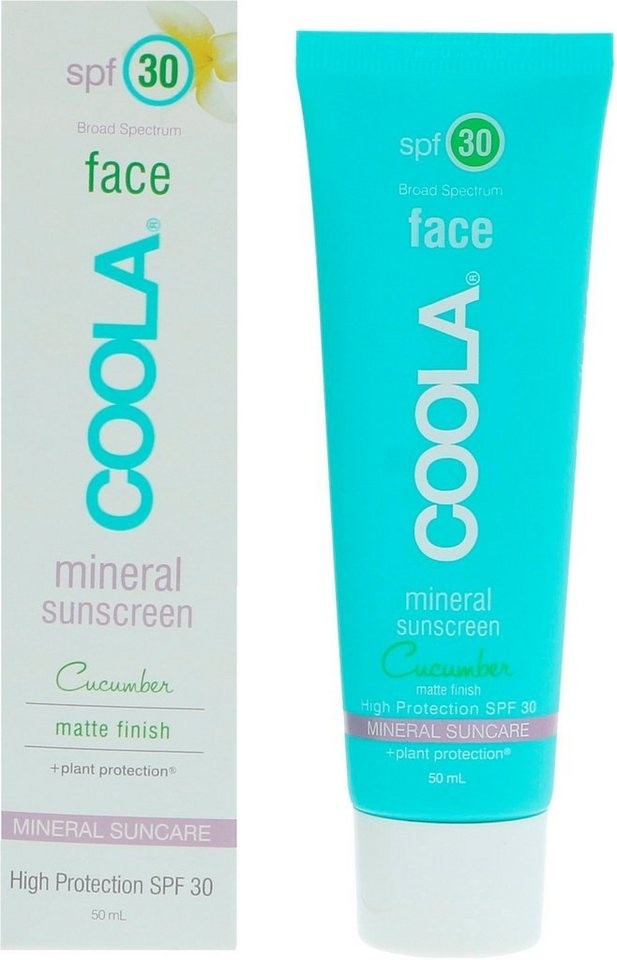
Some prefer to use mineral over chemical, as chemical sunscreens have been shown to absorb into the bloodstream and are thought to potentially lead to health risks-however, Garshick stresses that they are still considered safe to use.
#BEST COOLA SUNSCREEN FOR FACE SKIN#
However, as she explains, mineral sunscreens are thought to be better options for anyone with sensitive skin as some chemical ingredients can be irritating. “The best sunscreen is the one you will use, regardless of whether it’s mineral or chemical,” says Garshick.

When choosing between mineral or chemical sunscreen, one isn’t necessarily better than the other. “Always make sure to read the label and look at the active ingredients so you understand what you’re using.” “Mixed formulas aren’t a big problem unless you’re specifically trying to avoid chemical sunscreen ingredients,” says Garshick. “This is important because you should reapply sunscreen if exposed to water after 40 or 80 minutes, based on what’s indicated on the label.”Īs we mentioned above, some sunscreens can contain a combination of mineral and chemical ingredients, so be sure to check the label to see if it’s a purely mineral formula versus a mix of mineral blockers and chemical filters. “No matter what type of sunscreen you’re using, it’s important to understand the label and be aware of whether it’s water-resistant, and if so, for how long,” says Garshick. If you’ll be swimming and/or sweating a lot, you should also be using a water-resistant formula. “While it’s thought that UVB rays are responsible for sunburns and UVA rays are responsible for skin aging, both types of rays can contribute to skin cancer.” “This indicates coverage against both UVA and UVB rays,” she says. In addition to high enough SPF protection, Garshick says that broad-spectrum protection is also just as important. According to a recent report by EWG, sunscreens offering SPF protection above 50 may not necessarily provide stronger protection against UV rays, so there’s no need to look for anything higher than that. However, there’s also no need to shop for products with a super high SPF amount, either. “When applied and reapplied correctly, SPF 30 blocks 97% of UVB rays, while SPF 15 is thought to block just 93%,” she says.

When it comes to the amount of SPF protection in a sunscreen, Garshick stresses the importance of using a formula that contains SPF 30 or higher. What to Look For At Least SPF 30 Protection Marisa Garshick, MD, FAAD, is a board-certified dermatologist at MDCS: Medical Dermatology and Cosmetic Surgery Centers and is the Clinical Assistant Professor of Dermatology at Cornell University. Keep reading for the best mineral sunscreens to wear daily.

We then combined these results with the recommendations of board-certified dermatologist, Marisa Garshick, MD and our own research to compile a list of the best in show.

After using them for weeks at a time, our testers rated each formula's texture and feel and how well it protected their skin from sun damage. We went to work and tried a handful of top-rated mineral based sunscreens spanning a range of budgets, skin types, and concerns. Mineral formulas also have the benefit of being much less irritating, especially if your skin skews toward sensitivity. On the other hand, the two most commonly used mineral ingredients, titanium dioxide and zinc oxide, are both sunscreen ingredients the FDA has deemed to be generally safe and effective. Chemical blockers have come under some scrutiny as of late, due to recent findings concerning the efficacy of chemical ingredients and how much of them penetrate the bloodstream. Mineral sunscreens are physical blockers, which deflect the rays away from the skin opposed to chemical options, which absorb UV rays. For a more affordable pick, consider Neutrogena's Sheer Zinc Mineral Sunscreen, which has a non-greasy finish and offers SPF 50 protection against UVA and UVB rays. Its antioxidant-rich formula doesn't pill under makeup. Dennis Gross Skincare Lightweight Sunscreen, goes on sheer and protects your skin from blue light in addition to UV light.


 0 kommentar(er)
0 kommentar(er)
